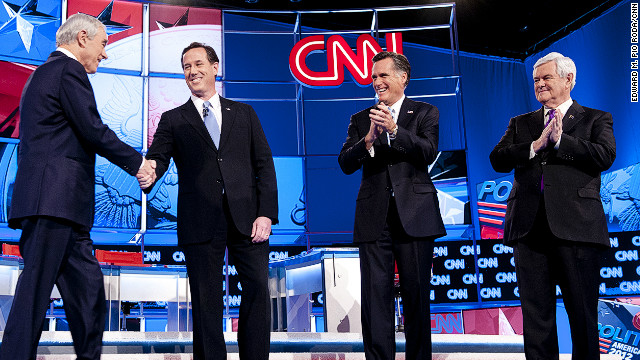 |
| Romney wins Michigan with Santorm a close second and Paul a surprising third. But what now? |
We are entering what has historically been considered the most important event in the primary season, a day that propels the winner a step closer to the oval office and sends the loser home to contemplate their defeat (until they win next cycle, but more on that later) - Super Tuesday. But that was then and this is now.
For those of you that don't follow this as closely as I do (good for you), Georgia, Ohio, Tennessee, Virginia, Oklahoma, Massachusetts, Idaho, North Dakota, Nebraska, and Vermont all cast their votes for a potential Republican nominee on March 6th, the day known to us junkies as Super Tuesday. Not two, not three, but four candidates aspiring for the nation's highest office are looking to take home the most votes next Tuesday, and the stakes are high: 437 delegates are up for grabs. This is over a third of the amount required for the nomination, three times more than the amount of delegates the NY Times gives Mitt Romney as of today, and over 100 more delegates than have been contested for during the last two months combined, all in a single day. Any candidate that wins a majority of the voters on Tuesday would immediately gain enormous momentum that would propel their candidacy towards nomination. So Super Tuesday matters a whole lot, right?
I'm not particularly convinced. Although Mitt Romney and Rick Santorum are polling at the top of nearly every state voting on Tuesday (with the exception of Georgia, which is behind Newt Gingrich for reasons unknown), it is likely that both candidates will receive closer to one third of the total delegates or less each rather than splitting them evenly. Why is this the case, if they are likely to win around the same number of contests?
The Republican party made and interesting choice this cycle to change their nomination rules in favor of more non-binding and proportional contests, practically ensuring that the nomination process becomes a long and dragged out affair, perhaps in an effort to simulate the excitement around the Clinton-Obama primary contest of 2007. The result of this is that at least 371 of the delegates to be decided (or not decided, in the case of the 28 from North Dakota, whose caucus is non-binding) are very likely to be awarded proportionately. Although certain states such as Virginia have a winner-takes-all clause, a candidate reaching the 50% required popular vote to trigger the clause is unlikely (except in Virginia where only Romney and Paul are on the ballot), and has only happened in one contest so far. This means that while Romney and Santorum may "win" most of the states with the most popular vote, the margin of victory between the winner and second (and even third) place will require delegates to be split rather equally.
So what does this mean for the importance of Super Tuesday? In terms of delegates, barring a major surge and unlikely but devastating sweep from Romney, not a whole lot. The projected delegates will likely maintain similar proportions to today once the dust has settled. Super Tuesday is much more about momentum: for Romney, it's about proving he really is "electable" and can consistently win these contests; for Santorum, it's showing that his support amongst rural and grassroots voters really can push him past the Romney money machine; for Gingrich, it's about stealing some southern states and getting his campaign some much-needed free airtime; for Paul, it's about leveraging the format of the contests to nab as many delegates as possible, despite the media favoritism towards his opponents and his resulting lag in popularity.
The really interesting thing here is that because of the sheer number of states voting, each candidate can accomplish (or claim to accomplish) his goal without the others failing. So it's probably worth asking the question again: does Super Tuesday really matter?
No comments:
Post a Comment